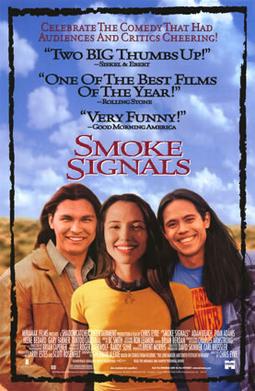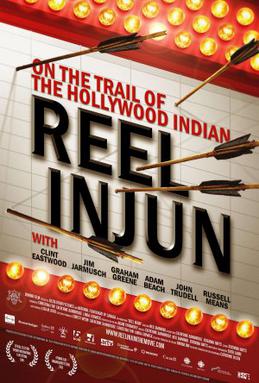Films
-
 Indian horse = Cheval Indien
by
Call Number: PN1997.2 .I5353 2018 dvdPublication Date: 2018Saul is a great native hockey player who overcomes racism in the 1970's then ultimately becomes tempted by alcoholism.
Indian horse = Cheval Indien
by
Call Number: PN1997.2 .I5353 2018 dvdPublication Date: 2018Saul is a great native hockey player who overcomes racism in the 1970's then ultimately becomes tempted by alcoholism. -
 Rhymes for young ghouls
by
Call Number: ONLINEPublication Date: 2014Red crow Mi'gMaq reservation, 1976: by government decree, every Indian child under the age of 16 must attend residential school. In the kingdom of the crow, that means imprisonment at St. Dymphna's. That means being at the mercy of "Popper", the sadistic Indian agent who runs the school. At 15, Aila is the weed princess of Red Crow. Hustling with her uncle Burner, she sells enough dope to pay Popper her 'truancy tax" keeping her out of St. Dymphna's. But when Aila's drug money is stolen and her father Joseph returns from prison, the precarious balance of Aila's world is destroyed. Her only options are to run or fight ... and Mi'gMaq don't run.
Rhymes for young ghouls
by
Call Number: ONLINEPublication Date: 2014Red crow Mi'gMaq reservation, 1976: by government decree, every Indian child under the age of 16 must attend residential school. In the kingdom of the crow, that means imprisonment at St. Dymphna's. That means being at the mercy of "Popper", the sadistic Indian agent who runs the school. At 15, Aila is the weed princess of Red Crow. Hustling with her uncle Burner, she sells enough dope to pay Popper her 'truancy tax" keeping her out of St. Dymphna's. But when Aila's drug money is stolen and her father Joseph returns from prison, the precarious balance of Aila's world is destroyed. Her only options are to run or fight ... and Mi'gMaq don't run. -
Atanarjuat the Fast Runner by
Call Number: ONLINEPublication Date: 2001This adaptation of an ancient Inuit legend was filmed in Inuktitut and directed by Inuit filmmakers - making Atanarjuat the first feature film of its kind! Set in Igloolik, in Nunavut, this is "a powerful drama, not a documentary," reminds the director Kunuk. "It demystifies the exotic, otherwordly aboriginal stereotype by telling a universal story." The clothes, spears, kayaks, sunglasses and dwellings were all painstakingly researched. "We show how our ancestors dressed, how they handled their dog teams, how they argued and laughed.. confronted evil and fought back." Many enthusiastic viewers have compared this epic story to The Iliad. In the words of one movie critic, "If Homer had been given a video camera, this is what he would have done!" In Inuktitut, with English subtitles. -
 Smoke signals
by
Call Number: PN1997 .S5944 1999 dvdPublication Date: 1999Young Indian man Thomas is a nerd on his reservation ... Victor and Thomas embark on a trip to Phoenix to retrieve the ashes of Victor's father. Victor is angry at his father for leaving his family and angry with himself for the grudge that he carries. Through the help of Thomas and his father's final friend Suzy, Victor is able to find resolution and peace
Smoke signals
by
Call Number: PN1997 .S5944 1999 dvdPublication Date: 1999Young Indian man Thomas is a nerd on his reservation ... Victor and Thomas embark on a trip to Phoenix to retrieve the ashes of Victor's father. Victor is angry at his father for leaving his family and angry with himself for the grudge that he carries. Through the help of Thomas and his father's final friend Suzy, Victor is able to find resolution and peace -
 Reel Injun
by
Call Number: PN1995.9.I48 R445 2010 dvdPublication Date: 2010Cree filmmaker Neil Diamond examines how the myth of the movie "Injun" has influenced the world's understanding, and misunderstanding, of Native peoples. With clips from hundreds of classic and recent films, and candid interviews with celebrated Native and non-Native directors, writers, actors and activists, Reel Injun traces the evolution of cinema's depiction of Native people from the silent film era to the present day.
Reel Injun
by
Call Number: PN1995.9.I48 R445 2010 dvdPublication Date: 2010Cree filmmaker Neil Diamond examines how the myth of the movie "Injun" has influenced the world's understanding, and misunderstanding, of Native peoples. With clips from hundreds of classic and recent films, and candid interviews with celebrated Native and non-Native directors, writers, actors and activists, Reel Injun traces the evolution of cinema's depiction of Native people from the silent film era to the present day.
Documentaries
-
 The Oka Legacy
by
Call Number: ONLINEPublication Date: 2015The Oka Legacy is a POV documentary that explores how the Oka Crisis has transformed contemporary Indigenous identity in Canada. Through Mohawk filmmaker Sonia Bonspille Boileau own personal journey, The Oka Legacy retraces the events that took place in her hometown in 1990 by talking with people who lived through the events firsthand, like Clifton Nicholas and Waneek Horn Miller, as well as with those who overcame grief like Francine Lemay and those like Melissa Mollen Dupuis and Johnny Jones who, even hundreds of kilometers away, were inspired to do great things. These compelling characters recount their own personal Oka Crisis stories and reflect on what its legacy is and what it should be.
The Oka Legacy
by
Call Number: ONLINEPublication Date: 2015The Oka Legacy is a POV documentary that explores how the Oka Crisis has transformed contemporary Indigenous identity in Canada. Through Mohawk filmmaker Sonia Bonspille Boileau own personal journey, The Oka Legacy retraces the events that took place in her hometown in 1990 by talking with people who lived through the events firsthand, like Clifton Nicholas and Waneek Horn Miller, as well as with those who overcame grief like Francine Lemay and those like Melissa Mollen Dupuis and Johnny Jones who, even hundreds of kilometers away, were inspired to do great things. These compelling characters recount their own personal Oka Crisis stories and reflect on what its legacy is and what it should be. -
nîpawistamâsowin : We Will Stand Up by
Call Number: ONLINEPublication Date: 2019On August 9, 2016, a young Cree man named Colten Boushie died from a gunshot to the back of his head after entering Gerald Stanley's rural property with his friends. The jury's subsequent acquittal of Stanley captured international attention, raising questions about racism embedded within Canada's legal system and propelling Colten's family to national and international stages in their pursuit of justice. Sensitively directed by Tasha Hubbard, nîpawistamâsowin: We Will Stand Up weaves a profound narrative encompassing the filmmaker's own adoption, the stark history of colonialism on the Prairies, and a vision of a future where Indigenous children can live safely on their homelands. -
Angry Inuk by
Call Number: ONLINEPublication Date: 2016In her film Angry Inuk, Inuk director Alethea Arnaquq-Baril joins a new tech-savvy generation of Inuit as they campaign to challenge long-established perceptions of seal hunting. Though most commercial sealing is conducted by Inuit in the Arctic, anti-sealing activism has created a perception of the industry that denies their central role in the sealskin market. To reinsert themselves into the international discussion, these Inuit activists must inconvenience the fundraising campaigns of animal groups by using all the tricks in the social media book, and invent some of their own along the way, like "sealfies." Seal meat is a staple food for Inuit, and many of the pelts are sold to offset the extraordinary cost of hunting. Inuit are spread across extensive lands and waters, and their tiny population is faced with a disproportionate responsibility for protecting the environment. They are pushing for a sustainable way to take part in the global economy, but in opposition stands an army of well-funded activists and well-meaning celebrities. Arnaquq-Baril and her cameras travel through the Canadian Arctic, giving voice to the people the animal activists rarely bother to meet: the hunters, the craftspeople, the families for whom the seal hunt is a critical part of their livelihood and survival. She follows a group of students to Europe, where they plead the Inuit case before a European Union panel. The film interweaves the reality of Inuit life with the story of their challenge to both the anti-sealing industry and those nations that mine resources on Inuit lands while simultaneously destroying the main sustainable economy available to the people who live there. As one student said, "We need to stop the cultural prejudice that is imposed on us by not being allowed to benefit from our natural surroundings without having to drill into the ground. And that's really all we want as a people." -
270 Years of Resistance by
Call Number: DVD MCF B66 A27 2008Publication Date: 2008Four films dealing with the Oka Crisis, a land dispute in the summer of 1990 between the Mohawk community of Kahnawake, (about 25 miles west of Montréal) and the nearby town of Oka. The dispute resulted in an armed standoff between the Mohawk people, the Québec police, and the Canadian army. -
 Keepers of the Fire
by
Call Number: DVD PW W45 K44 2007ISBN: Keepers of the FirePublication Date: 2007Aboriginal women from across Canada --Mohawk, Haida, Maliseet and Ojibwe-- speak out about their passionate struggle for their culture and dignity. Their different battles include: the Oka crisis of 1990; the blockade of logging roads on Lyell Island of the Queen Charlotte Islands in 1985; the campaign that compelled the passage of Bill C-31; and the founding of Anduhyaun, a Native women's shelter in Toronto.
Keepers of the Fire
by
Call Number: DVD PW W45 K44 2007ISBN: Keepers of the FirePublication Date: 2007Aboriginal women from across Canada --Mohawk, Haida, Maliseet and Ojibwe-- speak out about their passionate struggle for their culture and dignity. Their different battles include: the Oka crisis of 1990; the blockade of logging roads on Lyell Island of the Queen Charlotte Islands in 1985; the campaign that compelled the passage of Bill C-31; and the founding of Anduhyaun, a Native women's shelter in Toronto. -
Incident at Restigouche by
Call Number: DVD FS N433 N35 2006Publication Date: 2006On June 11 and 20, 1981, the Quebec Provincial Police (QPP) raided Restigouche Reserve, Quebec. At issue were the salmon fishing rights of the Micmac people. Because salmon has traditionally been a source of food and income for the Micmac, the Quebec government's decision to restrict fishing aroused consternation and anger among the Indians. This film provides an historical perspective on the issue, and documents, with newsclips, photographs and interviews, the two police raids. An interview with former Quebec Minister of Fisheries Lucien Lessard explaining the motives of his decision complements the Micmacs' account of the event. This investigation into the history-making raids is a powerful film that puts justice on trial